Student Union
Social Media Skills a Gift and Curse for Spying

LONDON — Before the Internet, being a spy was more challenging.
Now, spies have Facebook and LinkedIn and other social-media networking sites to expand their contacts, say former and current U.S. and British intelligence officials. And younger spies may be more skilled using social media to do their jobs.
Western governments accuse Russian intelligence services of exploiting social media platforms as propaganda, where they can plant “fake news,” deepen political discord and try to influence Western public opinion. But Russian spies — as opposed to trolls — also use networking sites in highly sophisticated ways to work their way into Western political circles.
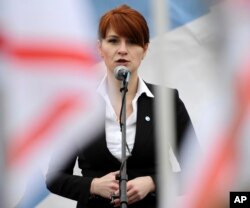
The case of Maria Butina -- who came to the United States in 2014 on a student visa and whom U.S. prosecutors allege is a Russian female spy -- shows how social media can assist covert influence operations, says a U.S. counter-intelligence official who asked not to be identified for this article.
“Butina was using old tradecraft, turning up at political events, making contacts," the official said, "and then befriending them on Facebook or LinkedIn and vice versa. Social media platforms are useful in mapping out friendship networks and opening doors.
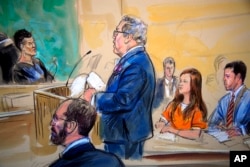
Butina, 29 and a recent graduate at American University in Washington where she attended the School of International Service, was charged last week with acting as an agent for the Kremlin in the United States. The Justice Department alleges she was in regular contact with Russian intelligence services. She has been indicted for conspiracy to operate on behalf of the Russian government and failing to register as a foreign agent.
She has not been formally charged with espionage, which would indicate stealing state and military secrets. Experts see her focused on getting into U.S. political circles in ways that would be useful for Russia’s foreign policy, including further seeding division between political parties in Western countries, and opening avenues of influence.
Federal prosecutors accuse Butina of conspiring with two American citizens, one with whom she cohabited, and the other a top Russian official. They are accused of trying influence U.S. policy more favorably toward Russia by infiltrating the National Rifle Association gun rights group and other conservative special interest groups that could be influential with the Trump administration.
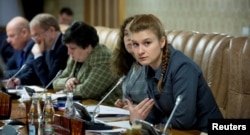
U.S. prosecutors allege in a memorandum filed in support of a request for Butina to be held in detention while she awaits trial. The memorandum says that the Russian gun-rights activist “maintained contact information for individuals identified as employees of the Russian FSB,” or Russian Federal Security Service.
Additionally, prosecutors claim FBI surveillance observed Butina having a private meal with a Russian diplomat whom the U.S. government expelled in March 2018 for suspicion of being a Russian intelligence officer.
From court papers filed by U.S. prosecutors last week it remains unclear whether her operation was initiated by Russia’s FSB, or whether it was conceived by her patron, Alexander Torshin, a Russian central banker, as a way to boost himself within the Kremlin administration.
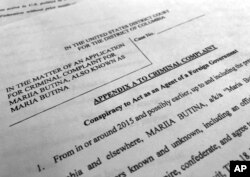
Many Russian intelligence officers occupy high-ranking positions in the government of Russian leader Vladimir Putin, himself a former KGB officer.
Among the more traditional techniques Butina allegedly used was offering sex to cozy up to U.S. politicians and lobbyists; in one case, according to U.S. prosecutors, to try to secure a job with an American special interest organization she had targeted. She lived with a Republican political operative twice her age. He has been identified in U.S. media as lobbyist Paul Erickson. She chafed, though, at the cohabitation, and, according to prosecutors she treated the relationship “as simply a necessary aspect of her activities.”
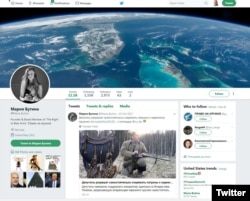
Posts are seen on Maria Butina's Twitter page. Butina has been arrested on charges of conspiring to act as an agent of the Russian government in the U.S. without notifying the attorney general.
Butina has pled not guilty. Her lawyer, Robert Driscoll, says she was only trying to help improve relations between the United States and Vladimir Putin’s Russia. He denies she’s a spy, telling CNN Friday that much of the case against her was “taken completely out of context.”
Butina founded a pro-gun group in Russia called Right to Bear Arms and used gun activism in what U.S. prosecutors allege was a “calculated, patient” plan directed by Torshin to infiltrate the NRA and conservative special interest groups.
Social media platforms were highly useful as she cut a swathe through U.S. conservative politics, boasting on her Facebook page of meetings with, among others, former Republican presidential candidates Rick Santorum and Scott Walker, the current Wisconsin governor.
In one e-mail to Butina, disclosed in court papers, Torshin praised her efforts, comparing them to Kremlin agent Anna Chapman, another flame-haired Russian who gained international notoriety after her 2010 arrest in the United States. Chapman and a handful of other Russians were deported to Russia in July 2010, as part of a prisoner exchange.
“You have upstaged Anna Chapman,” Torshin declared.
Journalist Michael Isikoff at Yahoo! News had a front seat view to Butina’s methods. With co-author David Corn, he published “Russian Roulette: The Inside Story Of Putin's War On America And The Election Of Donald Trump” and had been tracking Butina’s activities.
He said she and Torshin had been working to influence American conservative political organizations. He told the American public broadcaster NPR in an interview:
“As we reported in the book — David Corn and I — there's a Republican lobbyist who remembers being approached by her at a CPAC conference — Conservative Political Action Conference — and just being struck by how solicitous she was, how she wanted to stay in touch with him and become his Facebook friend.
"And this is a somewhat elderly gentleman, balding, wasn't used to this kind of attention from a young, attractive Russian woman.”
Hiding in plain sight on the Internet holds risks, too. Being active on Facebook increases the chance of exposure, prompting the attention of counter-intelligence watchers, as well as journalists. In an e-mail exchange with VOA, Isikoff noted, he “friended’ her [on Facebook] in order to get in touch so I could interview her.”
And a U.S. counter-intelligence official says Butina drew attention to herself on social media as much as her personal activities. She was called to testify earlier this year by the Senate Intelligence Committee, during which, according to CNN, she disclosed that her gun activism received funding from Russian billionaire Konstantin Nikolaev, another Kremlin-tied oligarch.
See all News Updates of the Day
- By VOA News
Competition grows for international students eyeing Yale

It’s tough to gain admission to Yale University, and it’s getting even tougher for international students as standout students from around the world set their sights on Yale.
The Yale Dale News, the campus newspaper, takes a look at the situation here.
- By VOA News
Student from Ethiopia says Whitman College culture made it easy to settle in

Ruth Chane, a computer science major from Ethiopia, writes about her experiences settling into student life at Whitman College in the U.S. state of Washington.
"The community at Whitman College made sure I felt welcomed even before I stepped foot on campus," she says.
- By VOA News
Claremont Colleges student gets a shock when she heads home to Shanghai

In The Student Life, the student newspaper for the Claremont Colleges, a consortium of five liberal art colleges and two graduate schools in Claremont, California, student Rochelle Lu writes about readjusting to her Shanghai home after spending a semester in the United States.
- By VOA News
Cedarville University aims to ease transition for international students

Cedarville University in the U.S. state of Ohio says it’s got more than 140 international students representing 44 countries.
Here, the school interviews Jonathan Sutton, director of international student services. He talks about his job and the opportunities for international students on campus.
- By VOA News
Morehouse College offers prospective students tips on applying and thriving

Morehouse College, a private, historically Black liberal arts college in the U.S. state of Georgia, offers a guide for international students interested in attending the school.
Among the tips to apply and thrive at Morehouse:
- Take advantage of the school’s orientation program
- Turn to the school’s Center for Academic Success for tutoring, support and more
- Immerse yourself in campus life via clubs and societies
- By Reuters
US reviews Columbia University contracts, grants over antisemitism allegations

The administration of President Donald Trump said on Monday it will review Columbia University's federal contracts and grants over allegations of antisemitism, which it says the educational institution has shown inaction in tackling.
Rights advocates note rising antisemitism, Islamophobia and anti-Arab bias since U.S. ally Israel's devastating military assault on Gaza began after Palestinian Hamas militants' deadly October 2023 attack.
The Justice Department said a month ago it formed a task force to fight antisemitism. The U.S. Departments of Health and Education and the General Services Administration jointly made the review announcement on Monday.
"The Federal Government's Task Force to Combat Anti-Semitism is considering Stop Work Orders for $51.4 million in contracts between Columbia University and the Federal Government," the joint statement said.
The agencies said no contracting actions had been taken yet.
"The task force will also conduct a comprehensive review of the more than $5 billion in federal grant commitments to Columbia University."
The agencies did not respond to requests for comment on whether there were similar reviews over allegations of Islamophobia and anti-Arab bias.
Columbia had no immediate comment. It previously said it made efforts to tackle antisemitism.
College protests
Trump has signed an executive order to combat antisemitism and pledged to deport non-citizen college students and others who took part in pro-Palestinian protests.
Columbia was at the center of college protests in which demonstrators demanded an end to U.S. support for Israel due to the humanitarian crisis caused by Israel's assault on Gaza. There were allegations of antisemitism and Islamophobia in protests and counter-protests.
During last summer's demonstrations around the country, classes were canceled, some university administrators resigned and student protesters were suspended and arrested.
While the intensity of protests has decreased in recent months, there were some demonstrations last week in New York after the expulsion of two students at Columbia University-affiliated Barnard College and after New York Governor Kathy Hochul ordered the removal of a Palestinian studies job listing at Hunter College.
A third student at Barnard College has since been expelled, this one related to the occupation of the Hamilton Hall building at Columbia last year.
Canada’s immigration overhaul signals global shift in student migration
From Europe to North America, nations are tightening their immigration policies. Now Canada, long seen as one of the world's most welcoming nations, has introduced sweeping changes affecting international students. The reforms highlight a growing global trend toward more restrictive immigration policies. Arzouma Kompaore reports from Calgary.
Trump administration opens antisemitism inquiries at 5 colleges, including Columbia and Berkeley

The Trump administration is opening new investigations into allegations of antisemitism at five U.S. universities including Columbia and the University of California, Berkeley, the Education Department announced Monday.
It's part of President Donald Trump's promise to take a tougher stance against campus antisemitism and deal out harsher penalties than the Biden administration, which settled a flurry of cases with universities in its final weeks. It comes the same day the Justice Department announced a new task force to root out antisemitism on college campuses.
In an order signed last week, Trump called for aggressive action to fight anti-Jewish bias on campuses, including the deportation of foreign students who have participated in pro-Palestinian protests.
Along with Columbia and Berkeley, the department is now investigating the University of Minnesota, Northwestern University and Portland State University. The cases were opened using the department's power to launch its own civil rights reviews, unlike the majority of investigations, which stem from complaints.
Messages seeking comment were left with all five universities.
A statement from the Education Department criticized colleges for tolerating antisemitism after Hamas' Oct. 7, 2023, attack on Israel and a wave of pro-Palestinian protests that followed. It also criticized the Biden administration for negotiating "toothless" resolutions that failed to hold schools accountable.
"Today, the Department is putting universities, colleges, and K-12 schools on notice: this administration will not tolerate continued institutional indifference to the wellbeing of Jewish students on American campuses," said Craig Trainor, the agency's acting assistant secretary for civil rights.
The department didn't provide details about the inquiries or how it decided which schools are being targeted. Presidents of Columbia and Northwestern were among those called to testify on Capitol Hill last year as Republicans sought accountability for allegations of antisemitism. The hearings contributed to the resignation of multiple university presidents, including Columbia's Minouche Shafik.
An October report from House Republicans accused Columbia of failing to punish pro-Palestinian students who took over a campus building, and it called Northwestern's negotiations with student protesters a "stunning capitulation."
House Republicans applauded the new investigations. Representative Tim Walberg, chair of the Education and Workforce Committee, said he was "glad that we finally have an administration who is taking action to protect Jewish students."
Trump's order also calls for a full review of antisemitism complaints filed with the Education Department since Oct. 7, 2023, including pending and resolved cases from the Biden administration. It encourages the Justice Department to take action to enforce civil rights laws.
Last week's order drew backlash from civil rights groups who said it violated First Amendment rights that protect political speech.
The new task force announced Monday includes the Justice and Education departments along with Health and Human Services.
"The Department takes seriously our responsibility to eradicate this hatred wherever it is found," said Leo Terrell, assistant attorney general for civil rights. "The Task Force to Combat Anti-Semitism is the first step in giving life to President Trump's renewed commitment to ending anti-Semitism in our schools."
- By VOA News
STEM, business top subjects for international students

The Times of India breaks down the most popular subjects for international students to study in the U.S.
STEM and business lead the pack. Read the full story here. (January 2025)
- By VOA News
Safety and visa difficulties among misconceptions about US colleges

U.S. News & World report addresses some of the misconceptions about U.S. colleges and universities, including the difficulty of getting a visa.
Read the full story here. (January 2025)
- By VOA News
Work opportunities help draw international students to US schools

US News & World Report details the three top factors in foreign students' decision to study in the U.S. They include research opportunities and the reputation of U.S. degrees. Read the full story here. (December 2024)
- By VOA News
British student talks about her culture shock in Ohio

A British student who did a year abroad at Bowling Green State University in Ohio talks about adjusting to life in America in a TikTok video, Newsweek magazine reports.
Among the biggest surprises? Portion sizes, jaywalking laws and dorm room beds.
Read the full story here. (December 2024)
- By VOA News
Harvard's Chan School tells international students what to expect

Harvard's T.H. Chan School of Public Health reaches out to international students by detailing the international student experience at the school.
Learn more about housing, life in Boston and more here.
- By Reuters
China unveils plan to build 'strong education nation' by 2035

China issued its first national action plan to build a "strong education nation" by 2035, which it said would help coordinate its education development, improve efficiencies in innovation and build a "strong country."
The plan, issued Sunday by the Communist Party's central committee and the State Council, aims to establish a "high quality education system" with accessibility and quality "among the best in the world."
The announcement was made after data on Friday showed China's population fell for a third consecutive year in 2024, with the number of deaths outpacing a slight increase in births, and experts cautioning that the downturn will worsen in the coming years.
High childcare and education costs have been a key factor for many young Chinese opting out of having children, at a time when many face uncertainty over their job prospects amid sluggish economic growth.
"By 2035, an education power will be built," the official Xinhua news agency said, adding that China would explore gradually expanding the scope of free education, increase "high-quality" undergraduate enrolment, expand postgraduate education, and raise the proportion of doctoral students.
The plan aims to promote "healthy growth and all-round development of students," making sure primary and secondary school students have at least two hours of physical activity daily, to effectively control the myopia, or nearsightedness, and obesity rates.
"Popularizing" mental health education and establishing a national student mental health monitoring and early warning system would also be implemented, it said.
It also aims to narrow the gap between urban and rural areas to improve the operating conditions of small-scale rural schools and improve the care system for children with disabilities and those belonging to agricultural migrant populations.
The plan also aims to steadily increase the supply of kindergarten places and the accessibility of preschool education.
- By VOA News
A look at financial aid options for international graduate students in US

The Open Notebook, a site focusing on educating journalists who cover science, has complied a list of U.S. graduate program financial aid information for international students.





